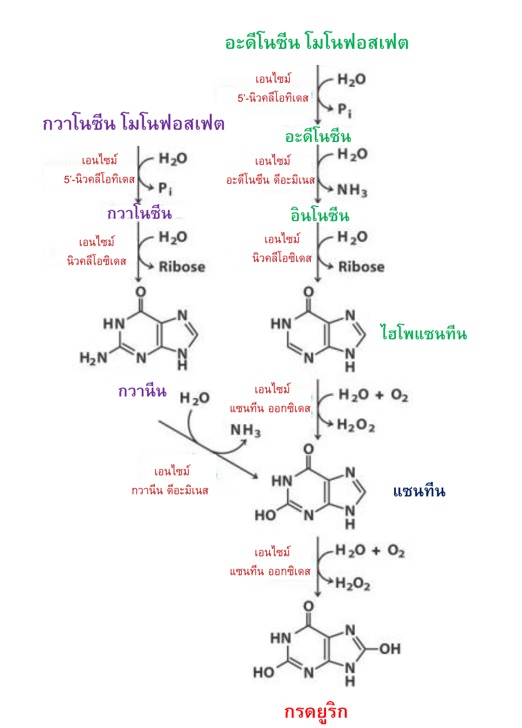Role of Cordycepin from Cordyceps militaris on lower hyperuricemia
Keywords:
Cordycepin, Cordyceps militaris, HyperuricemiaAbstract
Previously, scientific evidence reported that cordycepin (3'-deoxyadenosine), an important bioactive compound from Cordyceps militaris, has pharmaceutical affects for antimicrobial, immunomodulatory, anti-hyperglycemia, anti-tumor, anti-metastatic, fertility enhancer and inhibited melanogenesis activities. However, there are no report on anti-hyperuricemia which is the major risk factors for the development of gout and uric acid nephrolithiasis. Moreover, it effect on high mortality rates of hypertension, hyperlipidemia and atherosclerosis patients. Thus, this review article provided the theoretical guidance the role of Cordycepin from Cordyceps militaris on lower hyperuricemia actions in mice by decreasing serum uric acid and exhibited the strongest xanthine oxidase enzyme inhibitory activity on uric acid synthesis in vitro which will be beneficial for further development of therapeutic strategies for hyperuricemia treatment.
References
Tuli HS, Sharma AK, Sandhu, SS Kashyap D. Cordycepin: a bioactive metabolite with therapeutic potential. Life Sci. 2013,93(23): 863-9.
Das SK, Masuda M, Sakurai A, Sakakibara, M. Medicinal uses of the mushroom Cordyceps militaris: current state and prospects. Fitoterapia. 2010,81(8): 961-8.
Ahn YJ, Park SJ, Lee SG, Shin SC, Choi DH. Cordycepin: selective growth inhibitor derived from liquid culture of Cordyceps militaris against Clostridium spp. J. Agric. Food Chem. 2000,48: 2744-8.
Ma L, Zhang S, Du M. Cordycepin from Cordyceps militaris prevents hyperglycemia in alloxan-induced diabetic mice. Nutr. Res. 2015,35: 431-9.
Zhang P, Huang C, Fu C, Tian Y, Hu Y, Wang B, et al. Cordycepin (3′-deoxyadenosine) suppressed HMGA2, Twist1 and ZEB1-dependent melanoma invasion and metastasis by targeting miR-33b. Oncotarget 2015,6: 9834-53.
Chang Y, Jeng KC, Huang F, Lee YC, Hou CW, Chen KH, Cheng FY, Liao JW, Chen YS. Effect of Cordyceps militaris supplementation on sperm production, sperm motility and hormones in sprague-dawley rats. The American J. Chinese Medicine 2008,36 (5): 849-59.
Hong P, Choi YS, Woo SO, Han SM, Kim HK, Lee MR, Nam SH, Korean HN. Stimulatory effect of Cordyceps militaris on testosterone production in male mouse. J. Mycol. 2011,39(2): 148-50.
Patel KJ, Ingalhalli RS. Cordyceps militaris An important medicinal mushroom. J. Pharma. Phytochemical. 2013,2(1): 315-9.
Ji DB, Ye J, Li CL, Wang YH, Zhao J, Cai SQ. Anti-aging effect of Cordyceps sinensis extract. Phytother. Res. 2009,23: 116-22.
Nam B, Jo WS, Choi YJ, Lee JY, Kang EY, Jeong MN. Lee JD. Inhibitory effects of melanin secretion on B16 melanoma cell of Cordyceps militaris water extract. Kor. J. Mycol. 2010,38(2): 167-71.
Jin ML, Park SY, Kim YH, Park G, Son H, Lee S. Suppression of α-MSH and IBMX-induced melanogenesis by cordycepin via inhibition of CREB and MITF, and activation of PI3K/Akt and ERK - dependent mechanisms. International J. molecular medicine 2012,29: 119-24.
Aramwit P, Bang N, Ratanavaraporn J, Nakp T, Srichana T. An anti-cancer cordycepin produced by Cordyceps militaris growing on the dead larva of Bombax mori silkworm. J. Agri. Sci. 2014: 6-6.
Thongekkaew J. Nucleotide metabolism. In Biochemistry, 1st ed. Faculty of Science, Ubon Ratchathani University; 2011: 233.
Rock KL, Kataoka H, Lai JJ. Uric acid as a danger signal in gout and its comorbidities. Nat. Rev. Rheumatol. 2013,9: 13-23.
Liu R, Han C, Wu D, Xia X, Gu J, Guan H. et al. Prevalence of hyperuricemia and gout in mainland china from 2000 to2014: a systematic review and meta-analysis. Biomed. Res. Int. 2015,2015: 762-820.
Choi HK, Curhan G. Independent impact of gout on mortality and risk for coronary heart disease. Circulation 2007,116: 894-900.
Yong T, Zhang M, Chen D, Shuai O, Chen S, Su J, et al. Actions of water extract from Cordyceps militaris in hyperuricemic mice induced by potassium oxonate combined with hypoxanthine. J. Ethnopharmacol. 2016,194: 403-11.
Pacher P, Nivorozhkin A, Szabo C. Therapeutic effects of xanthine oxidase inhibitors: renaissance half a century after the discovery of allopurinol. Pharmacol. Rev. 2006,58: 87-114.
Halevy S, Ghislain PD, Mockenhaupt M, Fagot JP, Bouwes JN, Roujeau C. et al. Allopurinol is the most common cause of Stevens-Johnson syndrome and toxic epidermal necrolysis in Europe and Israel. J. Am. Acad. Dermatol. 2008,58: 25-32.
Becker MA, Schumacher HR, Espinoza LR, Wells AF, MacDonald P, Lloyd E. et al. The urate-lowering efficacy and safety of febuxostat in the treatment of the hyperuricemia of gout: the CONFIRMS trial. Arthritis Res. Ther. 2010,12: R63.
Harrold L. New developments in gout. Curr. Opin. Rheumatol. 2013,25: 304–9.
Tatani K, Hiratochi M, Kikuchi N, Kuramochi Y, Watanabe S, Yamauchi Y, et al. Identification of adenine and benzimidazole nucleosides as potent human concentrative nucleoside transporter 2 inhibitors: potential treatment for hyperuricemia and gout. J Med Chem. 2016,59: 3719–31.
Yong T, Zhang M, Chen D, Shuai O, Chen S, Su J, et al. Actions of water extract from Cordyceps militaris in hyperuricemic mice induced by potassium oxonate combined with hypoxanthine. J Ethnopharmacol. 2016,194: 403–11.
Yong T, Chen S, Xie Y, Chen D, Su J, Shuai O, Jiao C, Zuo,D. Cordycepin, a characteristic bioactive constituent in Cordyceps militaris, ameliorates hyperuricemia through URAT1 in hyperuricemic mice. Front. Microbiol. 2018,9: 1–12.
Quy TN, Xuan TD. Xanthine Oxidase Inhibitory Potential, Antioxidant and Antibacterial Activities of Cordyceps militaris (L.) Link Fruiting Body. Medicines. 2019,6(20): 1-13.

Downloads
Published
How to Cite
Issue
Section
License
Copyright (c) 2020 Naresuan Phayao Journal

This work is licensed under a Creative Commons Attribution-NonCommercial-NoDerivatives 4.0 International License.
ผู้นิพนธ์ต้องรับผิดชอบข้อความในบทนิพนธ์ของตน มหาวิทยาลัยพะเยาไม่จำเป็นต้องเห็นด้วยกับบทความที่ตีพิมพ์เสมอไป ผู้สนใจสามารถคัดลอก และนำไปใช้ได้ แต่จะต้องขออนุมัติเจ้าของ และได้รับการอนุมัติเป็นลายลักษณ์อักษรก่อน พร้อมกับมีการอ้างอิงและกล่าวคำขอบคุณให้ถูกต้องด้วย
The authors are themselves responsible for their contents. Signed articles may not always reflect the opinion of University of Phayao. The articles can be reproduced and reprinted, provided that permission is given by the authors and acknowledgement must be given.







